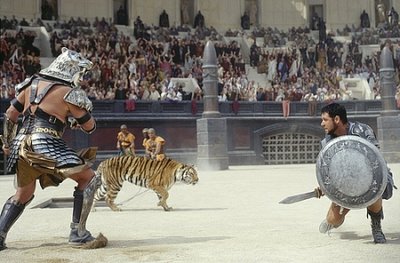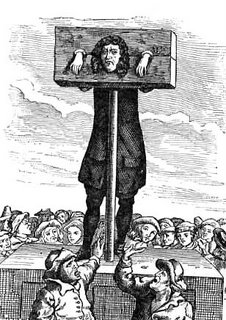
"ARE YOU NOT ENTERTAINED?!!"
As I have been trying to spread the word about our new blog, I have had more than one person ask me, "Why Bread and Circuses?" I would love to tell them and everyone else for that matter that the idea was entirely mine and that I had no help whatsoever. I would love to say that, but I would be lying--actually my brother Josh thought up this name without any help from me. When people have asked me this question about the name of our blog, I knew that eventually we would need to make a post giving its relation to our experiences at FBCH. First a little history would be in order:
During the years of the Roman Empire, there were some who used entertainment and food in the form of great feasts, Roman games, and grand circuses to divert attention from the current political injustice and unrest.
"In Juvenal's time (55-127 A.D.), the Roman Republic was but a distant memory as the power of the emperors grew stronger and stronger. The once proud Senate that had witnessed the splendid orations of Cato and Cicero, dominated and weakened year after year by the succession of dictators, atrophied into a figurehead of an institution. However, Juvenal felt that the populace took the duties of citizenship far more seriously during the days of the Republic than in the virtual dictatorships of the Caesars. He lamented that the people that once bestowed commands, consulships, legions, and all else, now meddle no more and longs eagerly for just two things, bread and circuses."
"Those scornful words 'bread and circuses,' or 'panem et circenses' in Latin, become more meaningful when you understand that Roman citizens became increasingly addicted to free distributions of food and the violent gladiatorial and other contests held in the Colosseum and the chariot races of the Circus Maximus. He felt that Romans had lost the capacity to govern themselves so distracted by mindless self-gratification had they become."1

"The Plebeian and freed population of Rome vastly outnumbered the Equestrian and Patrician classes, and their lives were much harder. Many had no jobs, little money and little food. Augustus, realizing that the masses of average Romans had to be kept both fed and happy enough to remain peaceful, began the system of patronage we now refer to as "bread and circuses." He gave the people food by means of grain distribution and legislation of food prices and free entertainment such as chariot races, gladiators, lavish spectacles in amphitheaters and the Circus Maximus."2
When I read about this Roman society and their appetite for more and more free entertainment and grandiose circus-like events, I could not help but immediately think of FBCH. They wait with bated breath for the next magnificent show and each one must outdo the last--the next big day--the next "famous" guest--the next fabulous fall or stupendous spring program--the next narcissistic event on the church calendar!

Just like the people of Rome during the days of the Republic, at one time FBCH was not ruled by one strong and charismatic personality! Just like the citizens in Rome under the direction of dictatorial Caesars became lazy and complacent with simply "not rocking the boat", I believe many of the good and decent people of FBCH have likewise adopted this philosophy. The picture of the impotent Roman Senate during the time of the emperors pictures almost perfectly the good men on the deacon board at FBCH--they are nothing more than a rubber stamp for anything the preacher/emperor desires to do or refrain from doing.
Much of what goes on in Hammond in the guise of ministry is nothing more than "free entertainment" in the form of panem et circenses! When you read about the Circus Maximus does any FBCH event come to mind? I can certainly think of a few!
Stay tuned...
Matthew Richards
1 Taken from article "Bread and Circuses" www.Suite101.com by Thomas James Martin
2 The New Dictionary of Cultural Literacy www.bartelby.com




